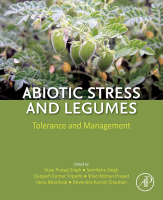Browse content
Table of contents
Actions for selected chapters
- Full text access
- Book chapterAbstract only
1 - Exploiting the potential of plant growth-promoting rhizobacteria in legume production
Shikha Gupta and Sangeeta Pandey
Pages 1-32 - Book chapterAbstract only
2 - Nod factor signaling in legume-Rhizobium symbiosis: Specificity and molecular genetics of nod factor signaling
Ajey Singh, N.B. Singh, ... Ravi Kumar Yadav
Pages 33-67 - Book chapterAbstract only
3 - The importance of plant growth–promoting rhizobacteria for plant productivity
Cem Ciftci, Dilek Tekdal and Selim Cetiner
Pages 69-80 - Book chapterAbstract only
4 - Modulations of legume plants in response to heavy metals induced stress
Neeru Bala, Priyanka Sharma, ... Jatinder Kaur Katnoria
Pages 81-91 - Book chapterAbstract only
5 - Role of sugars in mediating abiotic stress tolerance in legumes
Aditya Banerjee and Aryadeep Roychoudhury
Pages 93-103 - Book chapterAbstract only
6 - Circadian regulation of abiotic stress tolerance in legumes
Ajey Singh, Imtiyaz Hussain, ... N.B. Singh
Pages 105-136 - Book chapterAbstract only
7 - Polyamines: A promising strategy for imparting salinity stress tolerance in legumes
Amrita Sharma and Neera Garg
Pages 137-174 - Book chapterAbstract only
8 - Phytohormonal signaling under abiotic stress in legumes
Geetika Sirhindi, Sandeep Kumar, ... Gurvarinder Kaur
Pages 175-187 - Book chapterAbstract only
9 - Uncovering the role of melatonin as abiotic stress manager in legumes
Sukhmeen Kaur Kohli, Kanika Khanna, ... Renu Bhardwaj
Pages 189-216 - Book chapterAbstract only
10 - Role of reactive oxygen species in the regulation of abiotic stress tolerance in legumes
Ashutosh Sharma, Pooja Sharma, ... Indu Sharma
Pages 217-243 - Book chapterAbstract only
11 - Role of metabolites in abiotic stress tolerance in legumes
Neha Handa, Upma Arora, ... Renu Bhardwaj
Pages 245-276 - Book chapterAbstract only
12 - Quorum sensing signaling molecules and their inhibitors in legume-associated bacteria
Fiorela L. Nievas, Pablo C. Bogino and Walter Giordano
Pages 277-289 - Book chapterAbstract only
13 - Plant genes for abiotic stress in legumes
Dilek Tekdal
Pages 291-301 - Book chapterAbstract only
14 - MicroRNAs and abiotic stress tolerance in legumes
Puja Ohri, Renu Bhardwaj, ... Nandni Sharma
Pages 303-336 - Book chapterAbstract only
15 - QTL mapping for abiotic stress in legumes
Akanksha Singh, H.K. Dikshit, ... Shiv Kumar
Pages 337-370 - Book chapterAbstract only
16 - Genetic engineering of legumes for abiotic stress tolerance
Savita, Ashita Sharma, ... Avinash Kaur Nagpal
Pages 371-393 - Book chapterNo access
Index
Pages 395-402
About the book
Description
Abiotic Stress and Legumes: Tolerance and Management is the first book to focus on the ability of legume plants to adapt effectively to environmental challenges. Using the -omic approach, this book takes a targeted approach to understanding the methods and means of ensuring survival and maximizing the productivity of the legume plant by improving tolerance to environmental /abiotic stress factors including drought, temperature change, and other challenges.
The book presents a comprehensive overview of the progress that has been made in identifying means of managing abiotic stress effects, specifically in legumes, including the development of several varieties which exhibit tolerance through high yield using transcriptomic, proteomic, metabolomic and ionomic approaches. Further, exogenous application of various stimulants such as plant hormones, nutrients, sugars, and polyamines has emerged as an alternative strategy to improve productivity under these environmental challenges.
Abiotic Stress and Legumes: Tolerance and Management examines these emerging strategies and serves as an important resource for researchers, academicians and scientists, enhancing their knowledge and aiding further research.
Abiotic Stress and Legumes: Tolerance and Management is the first book to focus on the ability of legume plants to adapt effectively to environmental challenges. Using the -omic approach, this book takes a targeted approach to understanding the methods and means of ensuring survival and maximizing the productivity of the legume plant by improving tolerance to environmental /abiotic stress factors including drought, temperature change, and other challenges.
The book presents a comprehensive overview of the progress that has been made in identifying means of managing abiotic stress effects, specifically in legumes, including the development of several varieties which exhibit tolerance through high yield using transcriptomic, proteomic, metabolomic and ionomic approaches. Further, exogenous application of various stimulants such as plant hormones, nutrients, sugars, and polyamines has emerged as an alternative strategy to improve productivity under these environmental challenges.
Abiotic Stress and Legumes: Tolerance and Management examines these emerging strategies and serves as an important resource for researchers, academicians and scientists, enhancing their knowledge and aiding further research.
Key Features
- Explores the progress made in managing abiotic stress, specifically with high yield legumes
- Highlights the molecular mechanisms related to acclimation
- Presents proven strategies and emerging approaches to guide additional research
- Explores the progress made in managing abiotic stress, specifically with high yield legumes
- Highlights the molecular mechanisms related to acclimation
- Presents proven strategies and emerging approaches to guide additional research
Details
ISBN
978-0-12-815355-0
Language
English
Published
2021
Copyright
Copyright © 2021 Elsevier Inc. All rights reserved.
Imprint
Academic Press
